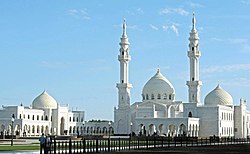| Tatarstan | |
 | |
Location .svg/250px-Map_of_Russia_-_Republic_of_Tatarstan_(2008-03).svg.png) | |
Coat of arms and flag  | |
| State | Russia |
|---|---|
| Region | Volga region |
| Capital | Kazan ' |
| Surface | 67,847 km² |
| Inhabitants | 3.838.230 (2014 census) |
| Institutional website | |
Tatarstan is a region of the Russia.
To know
There Republic of Tatarstan (in Russian Респуяблика Татарсталн or Татаярия) is an autonomous republic of the Russian Federation, with a capital Kazan '. Another unofficial version of the name is Tatarstan Cömhüriäte, where cömhüriät has, in Tatar, the meaning of republic. Some are calling for the restoration of the ancient Bulgaristan denomination.
Geographical notes
This republic is located in the center of the Eastern European plain, about 800 km east of Moscow. The natural boundaries are the Volga and Kama rivers, one of its tributaries, and the Ural mountains to the east. The maximum altitude reached by the Tatar territory is 343 meters. The major rivers are, at least in part, navigable: among the major ones are the Belaja, the aforementioned Kama and Volga, the Vyatka and Ik. As for the lakes, they are limited to two large reservoirs and a system of lakes, the Qaban. As in many of the Russian territories, the riches of the subsoil are great.
When to go
Average temperatures in January are around -16 ° C, while in July they are around 19 ° C, with average annual rainfall of up to 500 mm.
Background
The oldest state organization within the borders of Tatarstan was Volga Bulgaria (between about 700 and 1238). This state was an advanced merchant state with trade links across Eurasia, the Middle East and the Baltic, which managed to maintain its independence despite pressure from populations such as the Khazaries, Kievan Rus' and Kipchaks. The Islamic religion was introduced by Baghdad missionaries around the time of ibn Fadlan's voyage in 922.
Volga Bulgaria finally succumbed to the Mongol armies of Prince Batu Khan in the late 1930s. The inhabitants, after mingling with the Turkic-Mongolian peoples of the Golden Horde and the Kipchak-speaking troops, were known as Tatars of the Volga. During the third decade of the 15th century the region became independent again as the base of the Kazan Khanate, the latter having been founded in the vicinity of the destroyed capital of the Proto-Bulgarians.
The Tatar capital in an image from 1630. Tatarstan was conquered by the troops of Tsar Ivan the Terrible, in the mid-16th century, and Kazan was conquered in 1552. Part of the population was forced to convert to Christianity and cathedrals were built in the capital; before 1593 all the mosques in the area had been destroyed. The Russian government prohibited the construction of mosques, a ban which was canceled only in the 18th century by Catherine II. Only in the years between 1766 and 1770 was the first mosque rebuilt under the auspices of Catherine.
During the 19th century, Tatarstan became the center of Jadidism, an Islamic sect that preached tolerance towards other religions. Under the influence of the Tatar Jadidist theologians, this people was recognized for their friendly relations with the other peoples of the Russian Empire. However, after the October Revolution all religions were drastically outlawed and all theologians repressed.
During the civil war of 1918-20, the Tatar nationalists tried to establish an independent republic (the Idel-Ural Republic). They were defeated by the Bolsheviks and the Tatar Autonomous Soviet Socialist Republic was founded on May 27, 1920. The borders of this republic did not include most of the Volga Tatars.
This state declared its independence on August 30, 1990. On February 15, 1994 an agreement was signed between the government of the Russian Federation and that of the republic of Tatarstan (Delimitation of the Authority in the sphere of economic relations abroad): this agreement it is often regarded as a recognition of the independence of Tatarstan by the Russian Federation, since it mentions the Declaration on State Sovereignty of the Republic of Tatarstan.
On the same day, the Treaty on the Delimitation of Legal Entities and Mutual Delegation of Authority between the State Entities of the Russian Federation and the State Entities of the Republic of Tatarstan was also signed, and, although it does not directly recognize the sovereignty of Tatarstan, it complements / completes the previous political treaty.
Territories and tourist destinations
Urban centers
- Kazan ' (Казань)
- Al'met'evsk (Альметьевск)
- Bugul'ma (Бугульма)
- Elabuga (Елабуга)
- Leninogorsk (Лениногорск)
- Naberežnye Čelny (Набережные Челны)
- Nizhnekamsk (Нижнекамск)
- Zelenodol'sk (Tatarstan) (Зеленодольск)
- Čistopol ' (Чистополь)
Other destinations
- Svijažsk (Свияжск) - Charming village built on an islet between the Volga and Svjagi rivers.
